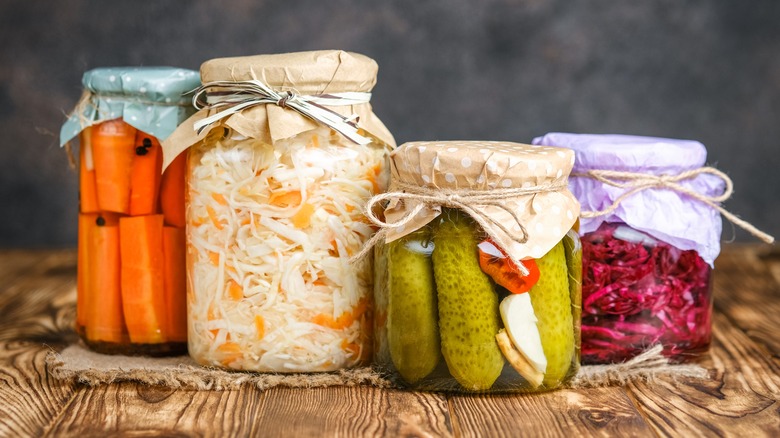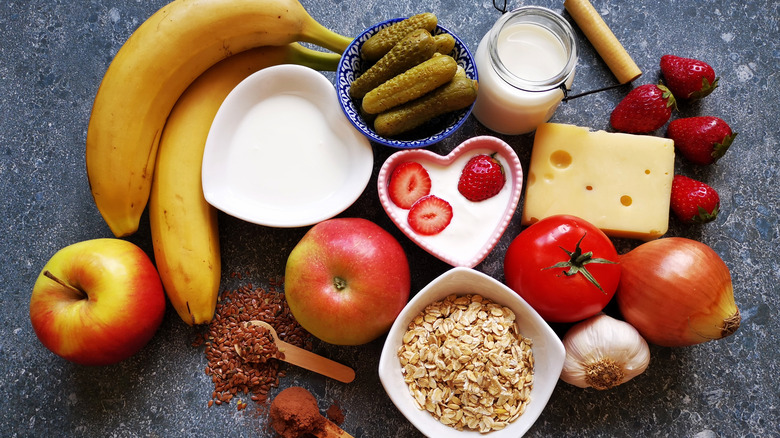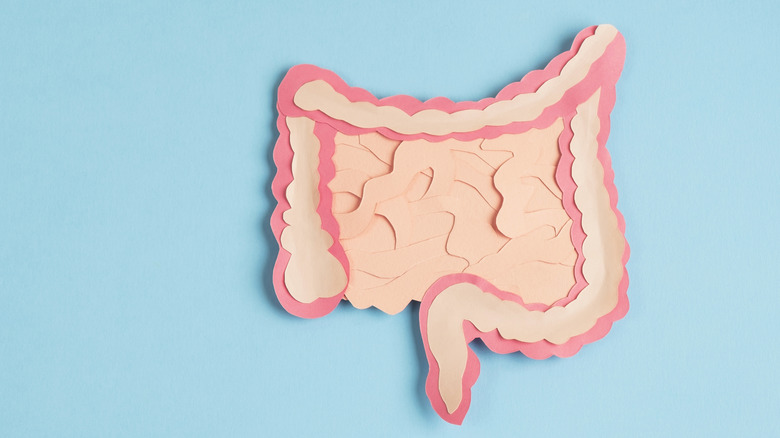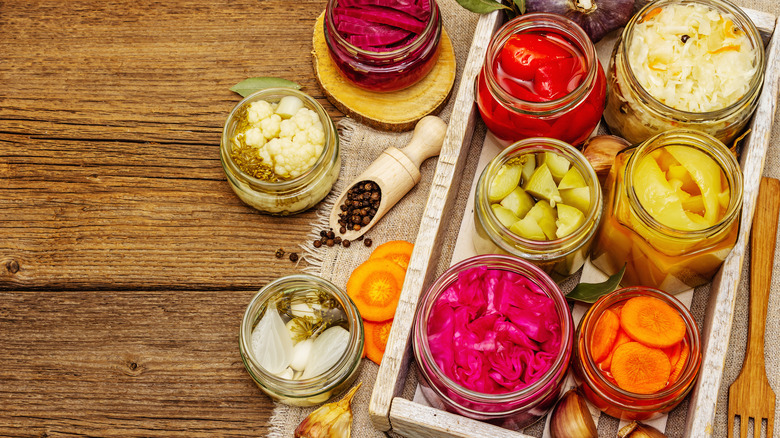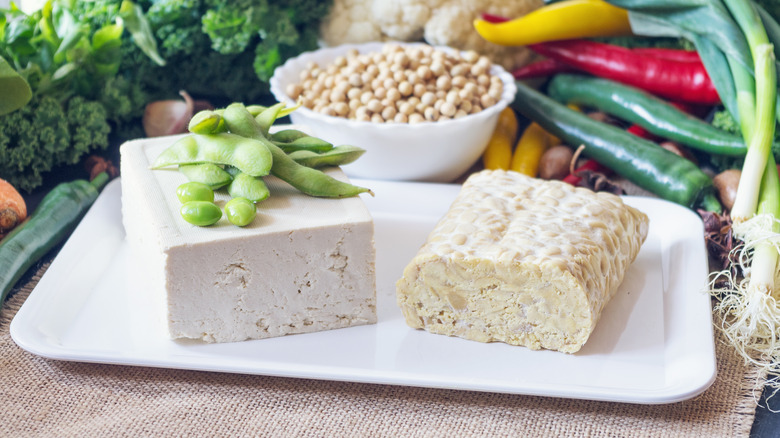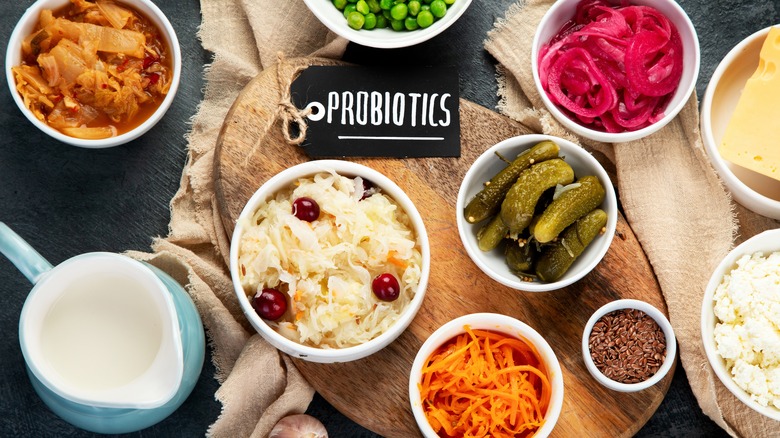14 Reasons To Add More Fermented Foods To Your Diet
Did you know some pickles can be good for you? Fermented foods first came about as a way to naturally preserve foods, and they've been a part of our diet for ages. These days, they're growing in popularity due to recent research revealing their many health benefits. Fermented foods are defined as any food or drink that has gone through a controlled fermentation process where bacteria and yeast break down parts of the food material, often changing its smell, taste, and look (via Heart Foundation). There are many different types of fermented foods, including pickles, sauerkraut, kimchi, tempeh, miso, yogurt, kombucha, kefir, even beer and wine (per Healthline).
However, according to Medical News Today, not all fermented foods are the same, and just because something is pickled doesn't mean it's fermented. For example, sometimes pickles are made using vinegar instead of the natural fermentation process. And even though cheese is technically considered a fermented food, it doesn't contain the same live microbes that a cultured dairy product like yogurt does. The presence of live cultures in a fermented food is the key component to its health benefits (via Harvard Health Publishing). When shopping for fermented foods, be sure to read the label and check for words like "live bacteria," "naturally fermented," or "probiotics." Let's explore some of the many reasons you will want to add more fermented foods to your meals.
They contain healthy probiotics and prebiotics
One of the main reasons fermented foods have health benefits is because they house probiotics and prebiotics. Our digestive tract contains about 100 trillion microorganisms and bacteria (via Harvard Health Publishing). Probiotics are thought of as the "good bacteria" that help keep the delicate gut microbiome balanced. You may have heard of the most common probiotic microorganisms — lactobacillus and bifidobacterium — both commonly found in yogurt (per Heart Foundation). Keep in mind that any fermented food that is pasteurized or heated to a high temperature will not contain probiotics. Since they are living organisms, heating them essentially kills them — also killing any potential health benefits.
On the other hand, prebiotics are food materials that the "good bacteria" eat to survive and thrive. Typically, it's foods that are high in fermentable fiber, including fruits and vegetables like apples, asparagus, green vegetables and tomatoes, and whole grains like oats and wheat (via WebMD). Just like probiotics, prebiotics have been linked with boosting the health of your gut microbiome.
Fermented foods can support digestion
Because fermented foods contain probiotics and prebiotics, they can help support your digestive system. This is because the "good bacteria" in probiotics help your body process and metabolize the food you eat (via Cleveland Clinic). Adding probiotics into your diet and balancing your gut microbiome improve overall digestion and can even ease digestive issues (per BBC Good Food). Plus, the natural fermentation process partially breaks down food so it's easier for your body to digest — it's almost like putting food in a blender so your digestive system doesn't have to work as hard.
Furthermore, fermented foods can also help alleviate symptoms found in lactose intolerance, a condition that makes it difficult to digest dairy products, resulting in uncomfortable stomach cramps, bloating, and diarrhea (per Healthline). In fact, one scientific study concluded that kefir, a drink made from fermented milk, helped with the digestion of lactose and may be a useful tool in treating the condition.
They can help reduce inflammation
Fermented foods have also been shown to have anti-inflammatory properties and help reduce inflammation in the body. Research has found that an unbalanced gut microbiome is linked with chronic inflammation and can lead to conditions like inflammatory bowel disease. Fermented foods may be able to reduce inflammation and ease digestive conditions like Crohn's and ulcerative colitis (via WebMD). According to one scientific study, a daily diet consisting of 200 milliliters (about 6.7 ounces) of kefir for six weeks led to a reduction in inflammatory markers.
Anti-inflammatory foods like fermented products may also help ease symptoms of chronic pain. Research suggests that an anti-inflammatory diet and a healthy gut microbiome can help manage pain sensitivity and even ease symptoms of chronic painful conditions like migraines, chronic fatigue syndrome, and back pain. Poor gut health has also been linked with fibromyalgia, a condition with wide-spread muscle pain, fatigue, and other symptoms, according to Health Rising.
They help you absorb and boost nutrients
One of the amazing health benefits of fermented foods is that they help your body assimilate and process nutrients in food, meaning you receive a higher amount of vitamins and minerals than you typically would by just eating regular food. The "good bacteria" in fermented foods help your body absorb important vitamins like B1, B2, B3, B5, B6, B12 and K (via Cleveland Clinic). This is especially helpful for vegetarians, since vitamin B12 is usually only found in animal products and is not naturally in plant-based food, according to Harvard Health Publishing. B vitamins are essential for many bodily functions, including sustaining a healthy metabolism, skin and brain cells, and many other organ tissues (via Medical News Today).
The procedure of fermentation also boosts the nutritional value of food in two ways: The "good bacteria" create vitamins and minerals through the natural process of fermentation, and they help reduce anti-nutrients like lectin that commonly get in the way of those nutrients being absorbed (per SciTechDaily). It's a win-win-win.
Fermented foods support your cardiovascular system
Furthermore, fermented foods are good for your heart. First off, many fermented foods have a high nutritional content that supports a healthy heart. On top of that, soy products like tempeh and miso, for instance, are known to reduce your risk for heart disease. One meta-analysis of several dozen studies found that soy protein helps promote healthy cholesterol levels and can lower LDL cholesterol (low-density lipoprotein cholesterol), which contributes to fat deposits in your arteries that increase your risk of stroke or heart attack (per American Heart Association).
Studies involving miso consumption, a fermented soybean seasoning often used in Japanese soup, have shown that it lowers your chance of stroke as well as promotes a healthy heart rate and blood pressure. All of these effects are supportive to the cardiovascular system and keep things running smoothly. This may be partially due to the anti-inflammatory properties of fermented foods — chronic inflammation in the body is associated with health issues like heart disease (via Healthline).
They can support your immune system
Probiotics have long been associated with a strong immune response (via Healthline). A healthy gut microbiome is directly linked to a healthy immune system. In fact, if your immune system had an office, it would be located in your digestive system. When the microbes in your gut sense a potential threat, they send a signal to your immune cells to get to work. The "good bacteria" in fermented foods help your immune system perceive and react to foreign invaders faster, strengthening your immunity. Ultimately, this lowers your chances of getting sick with the common cold, flu, or worse (via SciTechDaily).
A 2021 study conducted by Stanford School of Medicine found that sticking to a diet rich in fermented foods for at least 10 weeks can increase your immune system response. In the study, participants consumed yogurt, kefir, fermented cottage cheese, kimchi, fermented vegetables, vegetable brine drinks, and kombucha tea, which increased their microbiome diversity and boosted their immune system.
Fermented foods affect your mental health
As research expands into the gut microbiome and how it affects our bodies, scientists are learning that the probiotics contained in fermented foods may help ease mental health conditions like anxiety and depression (per BBC Good Food). This is due to the gut-brain connection, which refers to the fact that our brain and digestive system are literally linked inside our bodies via communication pathways. According to Raja Dhir, co-CEO of Seed Health and a gut microbiome expert, "The gut-brain axis is a bidirectional line of communication, meaning that gut health impacts brain health, and vice versa" (via Health Digest).
This means that not only does our mental state have a direct effect on our digestive system, but if the gut microbiome is unbalanced, it might actually contribute to mental health issues. Current research suggests that probiotics can help support brain health and boost serotonin — the "feel good" hormone — mitigating symptoms of anxiety and depression. Probiotics can also boost brain functions like memory, concentration, learning, and more (per WebMD). A healthy gut increases the chances of also having a healthy mental state.
Fermented foods help you recover from antibiotics
Antibiotics are a powerful tool that can help your body fight off bacterial infections. However, they come with a caveat — they work to destroy all bacteria in the body, both the "good" and "bad" bacteria in your gut. This can throw off the balance in your gut microbiome and lead to digestive symptoms like nausea, gas, and diarrhea. Fortunately, fermented foods can help counterbalance these side-effects. In fact, the Samaritan Health Services recommends consuming fermented foods while taking antibiotics to help balance your gut microbiome and mitigate any potential digestive upset.
Samaritan Health Services also advocates taking probiotic supplements during or after a course of antibiotics to replenish the good bacteria in your gut. Probiotic supplements can be found at health food stores, grocery stores like Whole Foods, or online. Probiotics also can lower your chances of developing a yeast infection or thrush, which are common after taking a course of antibiotics (via Medical News Today). Be sure to speak with your healthcare provider for more information on which supplements are right for you and how long you should take them.
They help reduce your risk for chronic illness
Fermented foods may help boost your overall health and well-being. According to Medical News Today, growing research suggests that fermented foods containing probiotics might help ease symptoms linked to many chronic health conditions, including urinary tract infections, respiratory system conditions, hormonal issues, kidney and liver issues, and even diabetes. Studies show that eating yogurt helps keep your blood sugar balanced and may help prevent type 2 diabetes (via WebMD). Some research even suggests that fermented dairy products lower your risk of developing bladder cancer.
Furthermore, an imbalance in the gut microbiome can lead to a condition called leaky gut syndrome, which is when food substances leak out of the intestines and into the body. Long-term leaky gut issues have been associated with many different physical and mental health conditions, including asthma, eczema, schizophrenia, and Alzheimer's disease, Dr. David S. Ludwig, a professor of nutrition at the Harvard T.H. Chan School of Public Health, told Harvard Health Publishing. Fermented foods can help support your gut microbiome and reduce your risk of developing chronic health issues.
Fermented foods are good for your bones
Many types of fermented foods have been known to boost bone health. In fact, one scientific study looked at people who had osteoporosis, a health condition that causes fragile bones, and found that those who consumed the probiotic drink kefir developed higher levels of bone mineral density when compared to those who didn't. This may be due to the high vitamin and mineral content of fermented products that can help strengthen bone mineral density. For example, kimchi and sauerkraut contain vitamin K2, vitamin B, manganese, phosphorus, magnesium and calcium (via Living Goodness).
Actually, several fermented foods like natto contain vitamin K, which is responsible for metabolizing calcium and building healthy bones (per Healthline). As a matter of fact, study after study on natto consumption in Japanese postmenopausal women revealed that it helped reduce bone loss and may help ward off osteoporosis, due to its rich vitamin, mineral, and flavonoid content.
They can help with weight management
Fermented foods can also help with weight management. According to WebMD, several fermented foods believed to help prevent weight gain include yogurt; green cabbage kimchi; and chungkookjang, a Korean fermented soybean product. One scientific study looked at mice that were fed a high-fat diet and found that those also consuming kimchi experienced less fat gain compared to those that didn't eat any kimchi. And a meta-analysis of studies involving fermented foods and weight gain in humans concluded that yogurt is widely associated with a lower body mass index (BMI), lower amounts of weight gain, a smaller waist size, and overall lower body fat.
Probiotic-rich foods help with weight control in several ways. First, some studies reveal that obesity is connected with a poor gut microbiome (per WebMD). Thus, building a healthy gut with fermented foods can help contribute to a healthy weight. Secondly, the natural fermentation process creates acetic acid, which has been known to help lower body fat. Plus, we know fermented foods are full of nutrients and aid in digestion, both of which of which are key to support a healthy weight (via Fermentation Recipes).
They can help with bacterial infections
Fermented foods have been shown to help fight bacterial infections in the gut, both addressing and easing symptoms associated with helicobacter pylori (H. pylori) and clostridium difficile infections (per Medical News Today). Many people have H. pylori bacteria in their stomachs — more than 50% of individuals worldwide, according to the Mayo Clinic. H. pylori is one of the most common sources of stomach and peptic ulcers. While some people with H. pylori infections are asymptomatic, others may experience signs including stomach pain or burning, nausea, appetite loss, burping, bloating, and unexplained weight loss.
Multiple scientific studies have shown fermented foods such as kefir and kombucha to reduce the growth of H. pylori bacterial infections. An additional study confirmed that the probiotic bacteria lactobacillus helped fight H. pylori due to its ability to lower the pH of the stomach, balance the gut, and support the response of the immune system.
Fermented foods are good for your teeth
Not only are fermented foods good at balancing the bacteria in your gut, but they also help support the bacteria in your mouth as well. That's right — there's also a biome of bacteria inside your mouth — and keeping it healthy can help prevent oral problems like tartar and plaque buildup, cavities, and gum disease (via WebMD). The "good" bacteria in your mouth help maintain nutrients and pre-digest the foods that you eat, while the "bad" bacteria can cause negative health issues like cavities. Feeding the "good" bacteria with probiotics from fermented foods helps keep your risk of oral health issues low (per Dental Pod).
Research studies have shown that people who consume fermented dairy products have a reduced risk for gum disease like gingivitis, according to Azure Family Dental. Plus, other studies suggest that probiotics help fight periodontopathic bacteria, which can cause periodontal disease in the gums and jawbone.
They are delicious
Set aside the countless health benefits of fermented foods for a moment — you might want to add them to a dish simply to level-up your recipe with that mouth-watering "pop." The natural fermentation process changes and enhances the flavors and textures of food and can add a unique aspect to a recipe that is almost hard to put into words. You've probably experienced the four basic flavor profiles out there: sweet, sour, salty, and bitter. But what about umami?
Umami is considered the fifth taste, and many fermented foods naturally possess that umami flavor, which is created during fermentation. In Japanese, umami translates to "yummy" or "savory" and is often described as a "rich, salty food" (via Real Simple). The umami flavor is most commonly affiliated with Asian dishes, but that's not the only place you'll find it. When it comes to fermented foods, miso, kimchi, and fermented vegetables like cabbage, asparagus, and mushrooms all have the umami taste. But you can also get umami flavor from shiitake mushrooms, parmesan cheese, ham, and some cured meats. So the next time your dish tastes rather boring and needs a pick-me-up, consider adding some fermented foods to the mix.
